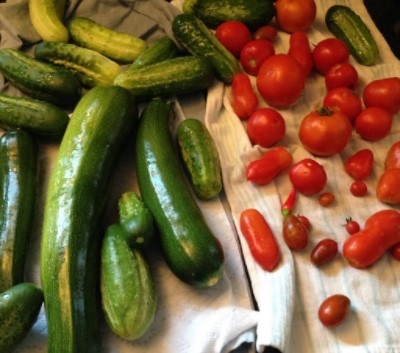Benefits of Organic Food for Your Health & Planet
back
Food tasting and recipe sharing is a tie that binds us here at Soulstice. Food brings us together in a variety of ways and we realize that what we eat is an essential element in our overall health and well-being.
That’s why we became curious about the benefits of organic food. Lucky for us, we have a handy resource, right here in our office with a great perspective and a lot of knowledge about how organic farming and organic food can help keep our bodies and our planet in the best of health.
Why Organic Food?
It’s common knowledge that our mothers were right. Eating fruits and vegetables is essential to maintain our bodies, and help us to live a long, healthy life. These foods are filled with minerals, antioxidants, phenols, fiber, flavonoids and other nutrients that support and protect us.
But Not All Fruits & Vegetables Are Created Equal.
There is a great deal of scientific evidence indicating that organic foods have greater concentrations of these beneficial nutrients, minerals and antioxidants. So much so that over the last several years, organic food has become sort of a buzzword in the health, nutrition, and agricultural arenas.
So what separates organic farming from conventional farming? What are the benefits of eating organic fruits and organic vegetables as opposed to standard produce?
Organic farming relies on organic fertilizers of organic origin such as compost, manure, green manure, and bone meal rather than so-called chemical fertilizers. It places a strong emphasis on such farming techniques as crop rotation, companion planting, mixed cropping, and the fostering of insect predators – all of which serve to keep pests and invasive weeds under control, without resorting to synthetic chemical fertilizers, pesticides, and herbicides.
Enhanced Appearance. Heightened Nutrition. Intensified Flavor.
Much like comparing a homegrown tomato with a GMO “flavr savr” tomato, bought at the store in winter, one of the benefits of organic food the sometimes huge difference in taste, appearance and nutrition.
As far as nutrition goes, one study indicates that organically grown blueberries have much higher levels of antioxidants, phenol, and anthocyanin content than conventional berries. Another study shows that levels of beneficial flavonoids in tomatoes, such as quercetin, were 79-97% higher in organic versus conventional produce. A study published in the British Journal of Nutrition, meanwhile, confirmed that concentrations of antioxidants such as polyphenols were between 18-69% higher in organic crops than in conventional crops, not to mention that organics were 50% less likely to contain toxic heavy metals like cadmium.
The end results of all these characteristics include:
- Lower adult obesity and type-2 diabetes rates
- Reduced cardiovascular disease rates
- Lower exposure to pesticides through food, improving cognitive development
- Lower prevalence of adolescent allergies
- Higher levels of antioxidants like omega-3 fatty acids, due to reduced processing in organic produce
Organic crops are healthier because they are challenged by pests and disease, causing them to produce antioxidants, phenols, flavonoids and other compounds to defend themselves. These compounds in turn benefit our bodies in a myriad of ways.
A USDA study determined that 73% of conventional produce on store shelves was contaminated with at least one pesticide, compared to 23% of organic crops.
In addition, many of today’s commonly used pesticides are known endocrine disruptors, and/or neurotoxins. Finally, meta-data studies strongly correlate pesticide exposure to impaired brain development in children.
Nutrition Is Only One Reason to Choose Organic Food Over Conventional Food
There are a number of environmental reasons to choose organic fruits and organic vegetables as well. Choosing organic produce reduces the amount of nitrate pollution from fertilizer runoff that results in ocean dead zones. Organic farming also promotes a healthy soil microbiome – reducing runoff, sequestering carbon, and making available soil nutrients for plants. Ultimately this leads to more nutrition for us.
A long-running USDA program pitting organic farming against conventional farming for environmental impacts largely concurs, finding that organic systems in the test:
- Have more-fertile soil
- Use less fertilizer and much less herbicide
- Use less energy to produce the produce
- Lock away more carbon in the soil
- Are more profitable for farmers
So all of these results are very compelling. Every time you buy organic food instead of conventional, you are improving your own health and that of the planet. Please vote with your dollar next time you shop, or better yet, grow your own!
Dane Vander Wall, Food Lover
Dane’s dad, Dr. Scott Vander Wall, DC, PC, is one of the health providers in our office. Check out his website to learn more about his practice: Heartwood Soft Tissue Balancing
And once you’ve enjoyed a delicious meal including plenty of organic fruits and vegetables, don’t forget to even further enhance your healthy habits with a visit to Soulstice. Call 303-628-0205 to set your appointment.
